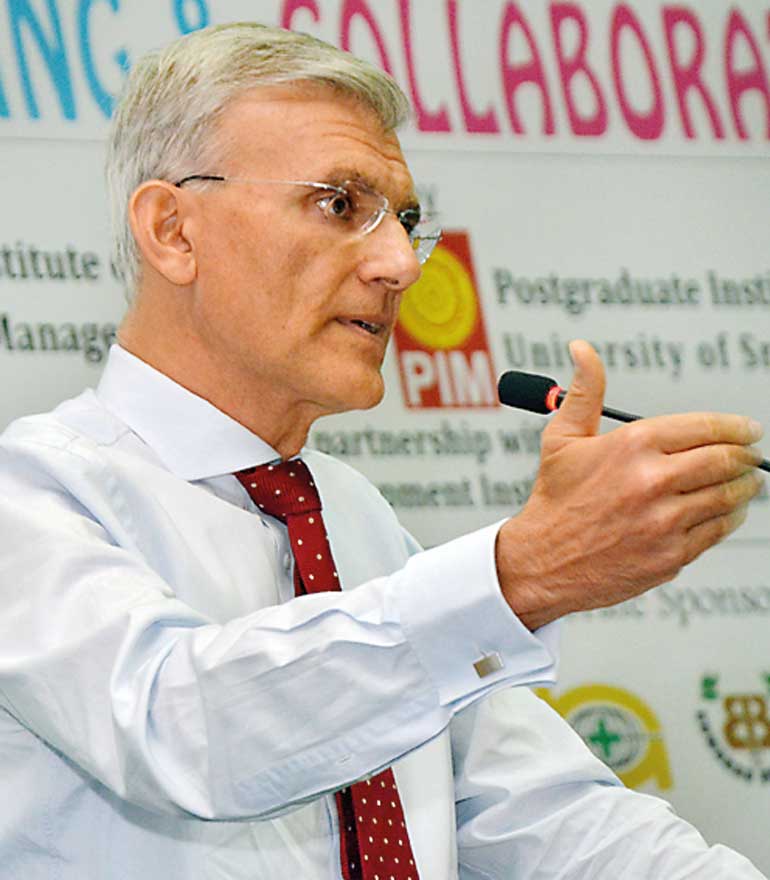Sunday Feb 22, 2026
Sunday Feb 22, 2026
Tuesday, 26 July 2016 00:01 - - {{hitsCtrl.values.hits}}
By Charumini de Silva
In a hard-hitting evaluation of the Government’s performance, top economist Dr. Razeen Sally yesterday criticised policymakers for failing to formulate a credible economic plan and warned that it was in danger of “squandering” the best opportunity for growth Sri Lanka has had in 40 years.
Highly-respected international economist Dr. Razeen Sally, who is an Associate Professor at the Lee Kuan Yew School of Public Policy at the National University of Singapore and Chairman of the Institute of Policy Studies (IPS) in Sri Lanka, pulled no punches while delivering the keynote address at the AMDISA Regional Management Conference.
Presenting his evaluation on the Government’s activities in the past 18 months Dr. Sally stressed the Government had failed to meet expectations.
“It hasn’t made that much progress, if any, in the past year-and-a-half for all sorts of political reasons. There is cohabitation between the President and the Prime Minister, there is an unwieldy unity Government, there have been several bad appointments, decision making has been rather messy and not as coordinated as it should be. For these and other reasons there has been blockage on economic policy. If things don’t change, then Sri Lanka faces either a future of continued drift, way below its potential, which of course if you like was the norm since Independence or it could get worse and unravel,” he told the gathering.
Dr. Sally was candid about his appraisal of the country’s economic fortunes, pointing out Sri Lanka’s post-war growth had not rested on “solid foundations”.
 IPS Chairman Dr. Razeen Sally – Pic by Upul Abayasekara
IPS Chairman Dr. Razeen Sally – Pic by Upul Abayasekara
“If I am to sum up the Rajapaksa years, there would be four points; there was more political authoritarianism, secondly there was what was increasingly becoming a virulent Sinhala-Buddhist agenda at the expense of the minorities, there was a very unbalanced foreign policy.
“And finally there was de-liberalisation of the economy. Growth was fuelled by a debt-creating public spending spree. Sri Lanka’s trade and trade competitiveness declined sharply over those years.”
Since the new Government came into power the positive aspects have been that political liberalism has returned to Sri Lanka, ethnic relations are better and the right symbolic gestures have been made, foreign policy has become positively balanced with China being maintained as a friend but relations with India and the West also being restored, Dr. Sally observed.
“The Government cannot afford to alienate China and friendships have also been restored with India, Europe and United States. The bad news is of the economy; also given expectations not least by the aspirational classes who voted first the President and this Government in, I think there is rising disappointment and frustration that not much has changed. In some aspects we have seen things get worse.”
“Macroeconomic management has always been something close to a disaster in Sri Lanka, it was so under the Rajapaksa regime and that has continued to be the case with two very bad Budgets last year. With public expense increases, salary increases and more expenditure entitlements along the way, which of course made Sri Lanka more reliant on debt including foreign commercial borrowing, which is increasingly vulnerable at a time when interest rates are probably on the rise and money is flowing out of emerging markets such as Sri Lanka,” he said.
Sri Lanka’s Extended Fund Facility (EFF) of $1.5 billion with the International Monetary Fund (IMF) is positive as it has assured tax reforms would be forthcoming but Dr. Sally noted that so far the Government failed to formulate a “credible plan” for reforming the economy. This includes the areas of taxation and expenditure as well as on freeing up the business climate domestically and liberalising Sri Lanka’s foreign trade and investment, according to the economist.
Dr. Sally also warned that if the economy did not perform and if Sri Lankans outside of Colombo continued to be frustrated, then the more liberal political atmosphere that Sri Lanka has enjoyed in the past year and a half could diminish.
“Sri Lanka has the best opportunity in 40 years to develop but that opportunity has not been taken advantage of in the last 18 months. I hope it won’t be squandered.”